
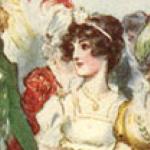
|
Catherine Morland “No one who had ever seen Catherine Morland in her infancy would have supposed her born to be an heroine.” And yet, here she is, the most unlikely young woman to be a heroine. At ten years old her “she had a thin awkward figure, a sallow skin without color, dark lank hair, and strong features;” her tastes were rather tomboyish: “She was found of all boys’ plays”; and her talents were not very promising for “she could never learn or understand anything before she was taught; and sometimes not even then, for she was often inattentive, and occasionally stupid.” But “at fifteen, appearances were mending; she began to curl her hair and long for balls; her features were soften by plumpness and color…her love of dirt gave way to an inclination for finery; and she grew clean as she grew smart.” Her personality was easy-going, “her heart was affectionate, her disposition cheerful and open, without conceit or affectation of any kind- her manners just removed from the awkwardness and shyness of a girl; her person pleasing, and, when in good looks, pretty- and her mind about as ignorant and uninformed as the female mind at seventeen usually is.” She is not very found of books, well, “provided they were all story and no reflection, she had never any objection to books at all.” Catherine Morland - young, not very pretty, not very talented, found of romantic stories, with a wild imagination, and longing for an adventure and hero of her own. |
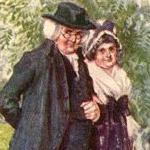
|
Rev. Morland Catherine’s father was “a clergyman, without being neglected, or poor, and a very respectable man, though his name was Richard - and he had never been handsome. He had a considerable independence, besides two good livings - and he was not in the least addicted to locking up his daughters.” He was also partly Catherine’s teacher: “writing and accounts she was taught by her father, french by her mother.” |
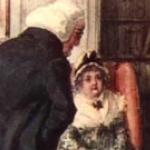
|
Mrs. Morland Catherine’s mother “was a woman of useful plain sense, with a good temper, and, what is more remarkable, with a good constitution. She had four sons before Catherine was born; and instead of dying in bringing (her) into the world, as anybody might expect, she still lived on – lived to have six children more – to see them growing up around her, and to enjoy excellent health herself.” Not only was she Catherine’s mother but she was also took joint responsibility with her husband in teaching their children though she “did not insist on her daughters being accomplished”. She was a very good woman and “wished to see her children everything they ought to be; but her time was so much occupied in lying-in and teaching the little ones, that her elder daughters were inevitably left to shift for themselves.” |
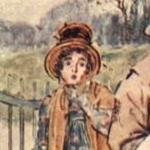
|
Sarah Morland Catherine’s sister is a year younger than her and is her particular friend: “Sally, or rather Sarah, (for what young lady of common gentility will reach the age of sixteen without altering her name as far as she can?) must from situation be at this time the intimate friend and confidant of her sister.” But when Catherine is to go off on her first big adventure to Bath, Sarah “neither insisted on Catherine’s writing by every post, nor exacted her promise of transmiting the charcter of every new acquaintance, nor a detail of every interesting conversation that Bath might produce.” |
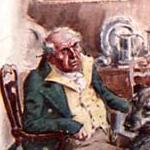
|
Mr. Allen “Mr. Allen, who owned the chief of the property about Fullerton,the village in Wiltshire where the Morlands lived, was ordered to Bath for the benefit of a gouty constitution”. He was the “squire of the parish” and “a sensible, intelligent man”. According to his wife he has little fashion sense: “I can never get Mr. Allen to know one of my gowns from the another.” Mrs. Allen also wonders at his hatred for his great coat: “I hope Mr. Allen will put on his greatcoat when he goes, but I dare say he will not, for he had rather do anything in the world than walk out in a greatcoat; I wonder he should dislike it, it must be so comfortable.” He is fond of cards and at a ball “he repaired directly to the card–room” leaving Mrs. Allen and Catherine to “them to enjoy a mob by themselves.” When he sent to Bath he and his wife invite Catherine to go with them if her parents agree. Thankfully “Mr. and Mrs. Morland were all compliance, and Catherine all happiness.” Though Mr. Allen doesn't have much to say and seems to ignore the ladies and think only of cards he does seem to have some paternal feelings for Catherine which prompt him to keep an eye on where she goes and who she associates with: “but that he was not objectionable as a common acquaintance for his young charge he was on inquiry satisfied; for he had early in the evening taken paint to know who her partner was”. |
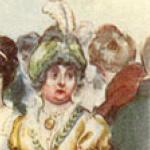
|
Mrs. Allen Mr. Allen’s wife “was one of that numerous class of females, whose society can raise no other emotion than surprise at there being any men in the world who could like them well enough, to marry them. She had neither beauty, genius, accomplishment, nor manner. The air of a gentlewoman, a good deal of quite, inactive good temper, and a trifling turn of mind.” Mrs. Allen is fond of Catherine and wishes to help her on in society. She is not that superior character but she is in one respect “admirably fitted to introducing a young lady into public, being as fond of going every where and seeing every thing as any young lady could be. Dress was her passion. She had a most harmless delight in being fine; and our heroine's entrée into life could not take place till after three or four days had been spent in learning what was mostly worn, and her chaperon had been provided with a dress of the newest fashion.” |
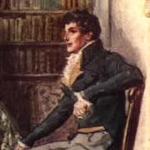
|
Henry Tilney On her first appearance in the Upper Rooms, Catherine has no one to dance with as Mrs. Allen does not know anyone. But on their appearance in the Lower Rooms Catherine is introduced my the master of ceremonies to “a very gentlemanlike young man as a partner; - his name was Tilney. He seemed to be about four or five and twenty, was rather tall, had a pleasing countenance, a very intelligent and lively eye, and if not quite handsome, was very near it. His address was good and Catherine felt herself in high luck.” And she was lucky in meeting him, he “talked with fluency and spirit-and there was an archness and pleasantry in his manner which interested, though it was hardly understood by her.” Mr. Allen finds him a good partner for his charge, he was assured of “Mr. Tilney’s being a clergyman, and of a very respectable family in Gloucestershire.” Mrs. Allen finds him a good conversationalist and educated in the art of buying fine muslin. When she asks him if he understands muslins he says: “Particularly well; I always buy my own cravats, and am allowed to be an excellent judge; and my sister has often trusted me in the choice of a gown. I bought one for her the other day, and it was pronounced to be a prodigious bargain by every lady who saw it.” Catherine watches him closely as he converses with Mrs. Allen and “feared, as she listen to their discourse, that he indulged himself a little too much in with the foibles of others.” He seems to a very polite tease! That Catherine liked him very much is evident but “weather she thought of him so much, as she drank her warm wine and water, and prepared herself for bed, as to dream of him when there, cannot be ascertained.” But on the day after meeting Mr. Tilney “with more than usual eagerness did Catherine hasten to the pump–room the next day, secure within herself of seeing Mr. Tilney there before the morning were over, and ready to meet him with a smile; but no smile was demanded — Mr. Tilney did not appear. Every creature in Bath, except himself, was to be seen in the room.” This is stranger indeed! He seems to be a man of mystery! |
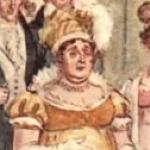
|
Mrs. Thorpe After lamenting for several days the lack of any acquaintance in Bath, Mrs. Allen is surprised in meeting an old school friend in the Pump Room one afternoon. After being content knowing nothing of each other for many years the two ladies are pleased to reclaim the acquaintance. Mrs. Allen finds that she is “a widow, and not a very rich one; she was a goodhumored, well-meaning woman, and a very indulgent mother.” Their conversation is very strange as they were “talking both together, far more ready to give than to receive information, and each hearing very little of what the other said. Mrs. Thorpe, however, had one great advantage as a talker, over Mrs. Allen, in a family of children; and when she expatiated on the talents of her sons, and the beauty of her daughters, when she related their different situations and views — that John was at Oxford, Edward at Merchant Taylors’, and William at sea — and all of them more beloved and respected in their different station than any other three beings ever were, Mrs. Allen had no similar information to give, no similar triumphs to press on the unwilling and unbelieving ear of her friend, and was forced to sit and appear to listen to all these maternal effusions, consoling herself, however, with the discovery, which her keen eye soon made, that the lace on Mrs. Thorpe’s pelisse was not half so handsome as that on her own.” |
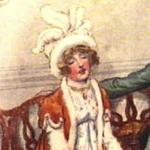
|
Isabella Thorpe Mrs. Thorpe is very eager to introduce her children to Mrs. Allen “Here come my dear girls,” cried Mrs. Thorpe, pointing at three smart–looking females who, arm in arm, were then moving towards her. “My dear Mrs. Allen, I long to introduce them; they will be so delighted to see you: the tallest is Isabella, my eldest; is not she a fine young woman?” Isabella immediately sees in Catherine, the same features of her brother’s friend James Morland who had spent the Christmas holidays with them near London. She and Catherine quickly make friends and start to talk of such things “as dress, balls, flirtations, and quizzes. Miss Thorpe, however, being four years older than Miss Morland, and at least four years better informed, had a very decided advantage in discussing such points; she could compare the balls of Bath with those of Tunbridge, its fashions with the fashions of London; could rectify the opinions of her new friend in many articles of tasteful attire; could discover a flirtation between any gentleman and lady who only smiled on each other; and point out a quiz through the thickness of a crowd.” The progress of the friendship between “Catherine and Isabella was quick as its beginning had been warm, and they passed so rapidly through every gradation of increasing tenderness that there was shortly no fresh proof of it to be given to their friends or themselves. They called each other by their Christian name, were always arm in arm when they walked, pinned up each other’s train for the dance, and were not to be divided in the set; and if a rainy morning deprived them of other enjoyments, they were still resolute in meeting in defiance of wet and dirt, and shut themselves up, to read novels together.” Catherine soon asks the Thorpes if they have met with Mr. Tilney but “from the Thorpes she could learn nothing, for they had been only two days in Bath before they met with Mrs. Allen. It was a subject, however, in which she often indulged with her fair friend, from whom she received every possible encouragement to continue to think of him.” |
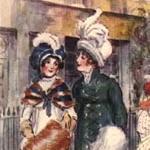
|
Anne & Maria Thorpe Isabella’s younger sisters “by pretending to be as handsome as their sister, imitating her air, and dressing in the same style, did very well.” Their mother, Mrs. Thorpe, says “ The others are very much admired too, but I believe Isabella is the handsomest.” |
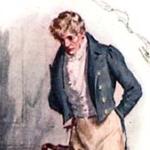
|
James Morland Soon after her meeting the Thorpes, Catherine and Isabella run into her eldest brother James and Isabella’s brother John Thorpe who have just come form their college at Oxford. Catherine is surprised and delighted to see him and “received her brother with the liveliest pleasure; and he, being of a very amiable disposition, and sincerely attached to her, gave every proof on his side of equal satisfaction, which he could have leisure to do, while the bright eyes of Miss Thorpe were incessantly challenging his notice; and to her his devoirs were speedily paid, with a mixture of joy and embarrassment which might have informed Catherine, had she been more expert in the development of other people’s feelings, and less simply engrossed by her own, that her brother thought her friend quite as pretty as she could do herself.” It is soon evident that James has come to Bath for the express purpose of gaining Isabella’s affections, and that she is very ready to give them. |
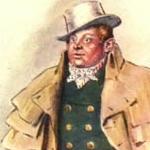
|
John Thorpe Isabella’s brother is introduced to Catherine and “while he slightly and carelessly touched the hand of Isabella, on her he bestowed a whole scrape and half a short bow.” He is a rather odd fellow: “a stout young man of middling height, who, with a plain face and ungraceful form, seemed fearful of being too handsome unless he wore the dress of a groom, and too much like a gentleman unless he were easy where he ought to be civil, and impudent where he might be allowed to be easy.” The four young people walk to Edgar's Buildings to see Mrs. Thorpe, who seems delighted to see her son though he says: “Ah, Mother! How do you do?” said he, giving her a hearty shake of the hand. “Where did you get that quiz of a hat? It makes you look like an old witch. Here is Morland and I come to stay a few days with you, so you must look out for a couple of good beds somewhere near.” And this address seemed to satisfy all the fondest wishes of the mother’s heart, for she received him with the most delighted and exulting affection. On his two younger sisters he then bestowed an equal portion of his fraternal tenderness, for he asked each of them how they did, and observed that they both looked very ugly.” His “manners did not please Catherine; but he was James’s friend and Isabella’s brother; and her judgment was further bought off by Isabella’s assuring her…that John thought her the most charming girl in the world, and by John’s engaging her before they parted to dance with him that evening.” He is a strange fellow, fond of horse and gigs, and full of bluster and contradicions. But one thing he is determined on, for he repeats it several times: “I did not come to Bath to drive my sisters about ; that would be a good joke, faith!” |
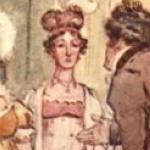
|
Mrs. Hughes At the ball that evening, while Catherine is waiting to dance with John Thorpe, she sees again, to her great surprise, Mr. Tilney with a young lady on his arm! “Mr. Tilney and his companion, who continued, though slowly, to approach, were immediately preceded by a lady, an acquaintance of Mrs. Thorpe; and this lady stopping to speak to her, they, as belonging to her, stopped likewise.” Mrs. Hughes is serving as a chaperone for Mr. Tilney’s sister and Mrs. Allen finds out later after talking to her that Mr. Tilney’s mother, “Mrs. Tilney was a Miss Drummond, and she and Mrs. Hughes were schoolfellows.” |
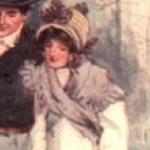
|
Eleanor Tilney When Catherine meets Mr. Tilney again he is “talking with interest to a fashionable and pleasing–looking young woman, who leant on his arm, and whom Catherine immediately guessed to be his sister.” Catherine’s interest in her is immediately roused and she is happy when Mrs. Hughes asks is Miss Tilney could sit next to her. “Mrs. Hughes could not have applied to any creature in the room more happy to oblige her than Catherine. The young ladies were introduced to each other, Miss Tilney expressing a proper sense of such goodness, Miss Morland with the real delicacy of a generous mind making light of the obligation; and Mrs. Hughes, satisfied with having so respectably settled her young charge, returned to her party. “Miss Tilney had a good figure, a pretty face, and a very agreeable countenance; and her air, though it had not all the decided pretension, the resolute stylishness of Miss Thorpe’s, had more real elegance. Her manners shewed good sense and good breeding; they were neither shy, nor affectedly open; and she seemed capable of being young, attractive, and at a ball, without wanting to fix the attention of every man near her, and without exaggerated feelings of extatic delight or inconceivable vexation on every little trifling occurrence.” Mrs. Allen is happy with her appearance “Miss Tilney was in a very pretty spotted muslin, and I fancy, by what I can learn, that she always dresses very handsomely.” |
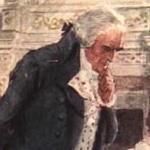
|
General Tilney Catherine has the good fortune to soon afterwards be engaged to dance with Mr. Tilney, but while they are dancing, “Catherine perceived herself to be earnestly regarded by a gentleman who stood among the lookers–on, immediately behind her partner. He was a very handsome man, of a commanding aspect, past the bloom, but not past the vigour of life.” Mr. Tilney explains that this gentleman is General Tilney, his father. Catherine is quite in awe of the General’s fine gentlemanlike appearance and kind attentions to herself in issuing a joint invitation with his daughter that Miss Catherine Morland come to stay with them at Northanger Abbey! But perhaps the General is not all that Catherine thought him to be. |
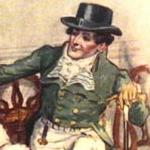
|
Captain Frederick Tilney Henry and Eleanor’s older brother who is a Captain in the army. Catherine first sees him at a ball: “having heard the day before in Milsom Street that their elder brother, Captain Tilney, was expected almost every hour, she was at no loss for the name of a very fashionable–looking, handsome young man, whom she had never seen before, and who now evidently belonged to their party. She looked at him with great admiration, and even supposed it possible that some people might think him handsomer than his brother, though, in her eyes, his air was more assuming, and his countenance less prepossessing. His taste and manners were beyond a doubt decidedly inferior; for, within her hearing, he not only protested against every thought of dancing himself, but even laughed openly at Henry for finding it possible.” Yet Captain Tilney does not seem to have the same feelings of dancing when he sees Miss Isabella Thorpe. He seems destined to be a trouble maker. |
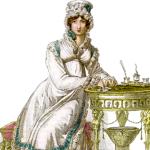
|
Mrs. Tilney The deceased wife of General Tilney and mother of Frederick, Henry, and Eleanor Tilney. Mrs. Allen says:“Mrs. Tilney was a Miss Drummond, and she and Mrs. Hughes were schoolfellows; and Miss Drummond had a very large fortune; and, when she married, her father gave her twenty thousand pounds, and five hundred to buy wedding–clothes. I am sure Mrs. Tilney is dead, because Mrs. Hughes told me there was a very beautiful set of pearls that Mr. Drummond gave his daughter on her wedding–day and that Miss Tilney has got now, for they were put by for her when her mother died.” While at Northanger Abbey Eleanor shows Catherine a portrait of her mother “It represented a very lovely woman, with a mild and pensive countenance.” At Northanger Catherine comes upon some secrets that may suggest Mrs. Tilney’s death was not from natural causes! |
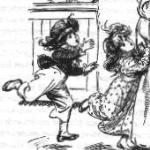
|
Other Morlands Catherine was the eldest girl of nine children, “A family of ten children will be always called a fine family, where there are heads and arms and legs enough for the number; but the Morlands had little other right to the word, for they were in general very plain.” Jane Austen said Mrs. Morland “had four sons before Catherine was born; and instead of dying in bringing the latter into the world, as anybody might exspect, she still lived on – lived to have six children more.” And Catherine said that James Morland was her eldest brother, so this means that he was the first born. After James there are three more boys two of which we don’t know the names of. Mrs. Morland mentions the name of one of them: “I do not know when poor Richard’s cravats would be done, if he had no friend but you.” Since Catherine was at home Mrs. Morland must be speaking of her son who is living at home. Sarah, is after Catherine, and the youngest two children’s names are also mentioned: “a pleasure quite unlooked for by all but the two youngest children, a boy and girl of six and four years old, who expected a brother or sister in every carriage. Happy the glance that first distinguished Catherine! Happy the voice that proclaimed the discovery! But whether such happiness were the lawful property of George or Harriet could never be exactly understood.” |
| Grand Entrance |
The Library |
The Ballroom |
The Parlor |
Dining Room |
Elizabeth's Room |
Anne's Room |
Sir Walter |
The Gardens |
Jane Austen |
Site Map |